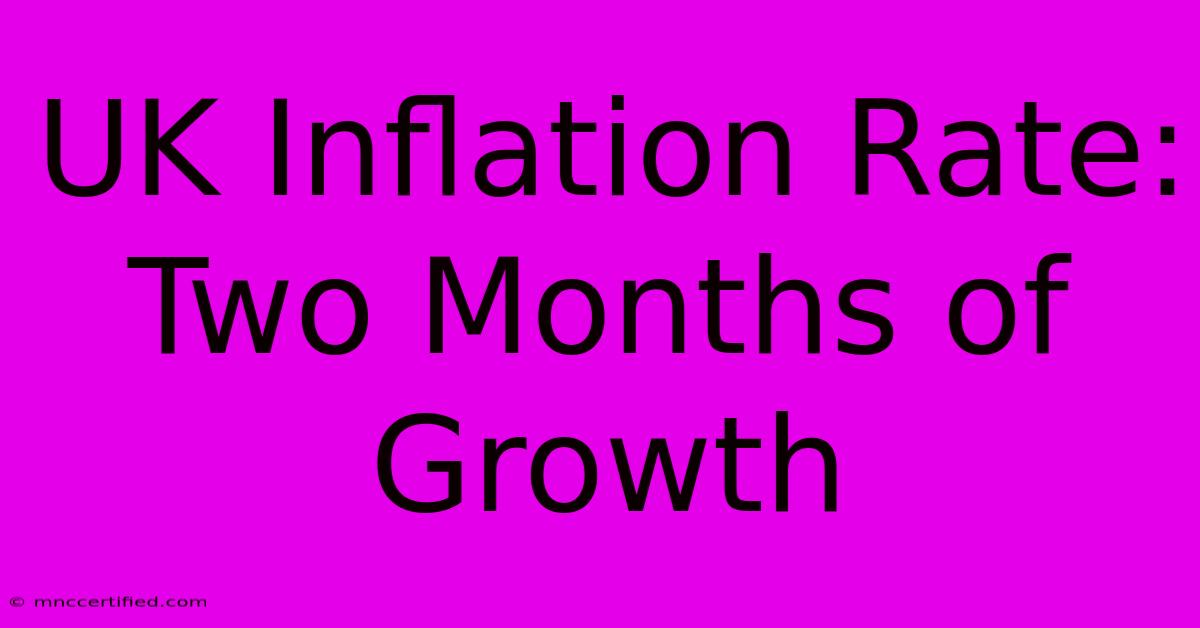UK Inflation Rate: Two Months Of Growth

Table of Contents
UK Inflation Rate: Two Months of Growth – A Deeper Dive into the Numbers
The UK has witnessed two consecutive months of rising inflation, sparking renewed concerns about the cost of living crisis. This article delves into the recent data, explores potential causes, and examines the implications for consumers and the economy. Understanding this trend is crucial for navigating the current economic landscape.
Understanding the Recent Inflation Spike
The Office for National Statistics (ONS) recently released figures showing a rise in the UK Consumer Price Index (CPI) inflation rate for two consecutive months. While the exact figures fluctuate slightly depending on the data source and reporting period, the overarching trend is undeniable: inflation is increasing. This represents a significant shift from the previous period of relative stability and declining inflation rates.
Key Factors Contributing to the Rise:
Several factors are contributing to this upward trend:
- Energy Prices: Fluctuations in global energy markets, particularly related to oil and gas, significantly impact inflation. Increased energy costs are passed down the supply chain, affecting everything from transportation to manufacturing. This is a major driver in the current inflation surge.
- Supply Chain Disruptions: Lingering effects of the pandemic and geopolitical events continue to disrupt global supply chains. Shortages of goods and increased transportation costs lead to higher prices for consumers.
- Wage Growth: While wages are increasing in some sectors, they often lag behind the rate of inflation. This means that despite earning more, people's real disposable income is still shrinking, contributing to the cost of living crisis.
- Increased Demand: Post-pandemic pent-up demand coupled with strong consumer spending, particularly in certain sectors, puts upward pressure on prices. This increased demand outstrips the supply, resulting in inflation.
The Implications of Rising Inflation
The consequences of sustained inflation are far-reaching:
- Reduced Purchasing Power: Higher prices erode the purchasing power of consumers, impacting their ability to afford essential goods and services. This leads to a decline in living standards.
- Increased Interest Rates: To combat inflation, the Bank of England (BoE) may increase interest rates. Higher interest rates make borrowing more expensive for businesses and consumers, potentially slowing economic growth. This is a key tool used to control inflation but carries the risk of triggering a recession.
- Uncertainty in the Market: Rising inflation creates uncertainty in the market, potentially leading to decreased investment and economic instability. This uncertainty affects business planning and consumer confidence.
Looking Ahead: What to Expect
Predicting future inflation is complex, but several factors will influence the UK's inflation rate in the coming months:
- Government Policy: Government interventions, such as energy price caps or support packages, can significantly impact inflation. The government's response to the cost of living crisis will play a crucial role.
- Global Economic Conditions: Global economic events and geopolitical instability continue to influence the UK economy and its inflation rate. International factors remain a significant unknown.
- BoE Actions: The Bank of England's monetary policy decisions, particularly regarding interest rates, will be key in determining the future trajectory of inflation.
Conclusion: Navigating the Uncertainties
The recent rise in the UK inflation rate presents significant challenges. Understanding the contributing factors and their implications is crucial for both individuals and businesses. Staying informed about economic data releases from the ONS and the BoE, and understanding the government’s response, is essential for navigating the uncertainties of the current economic climate. This period of inflation underscores the importance of robust financial planning and a proactive approach to managing personal finances in a volatile economic environment. Further analysis and monitoring of these factors will be necessary to accurately predict the UK’s economic future.

Thank you for visiting our website wich cover about UK Inflation Rate: Two Months Of Growth. We hope the information provided has been useful to you. Feel free to contact us if you have any questions or need further assistance. See you next time and dont miss to bookmark.
Featured Posts
-
Wisconsin School Teacher Reports Shooting Threat
Dec 18, 2024
-
And Ones Timma Nba Cup And Trade Talk
Dec 18, 2024
-
Stream Memphis Vs West Virginia Game 12 17 24
Dec 18, 2024
-
Yankees Cubs Trade Talks Update
Dec 18, 2024
-
Vanuatu Buildings Damaged Casualties Confirmed
Dec 18, 2024